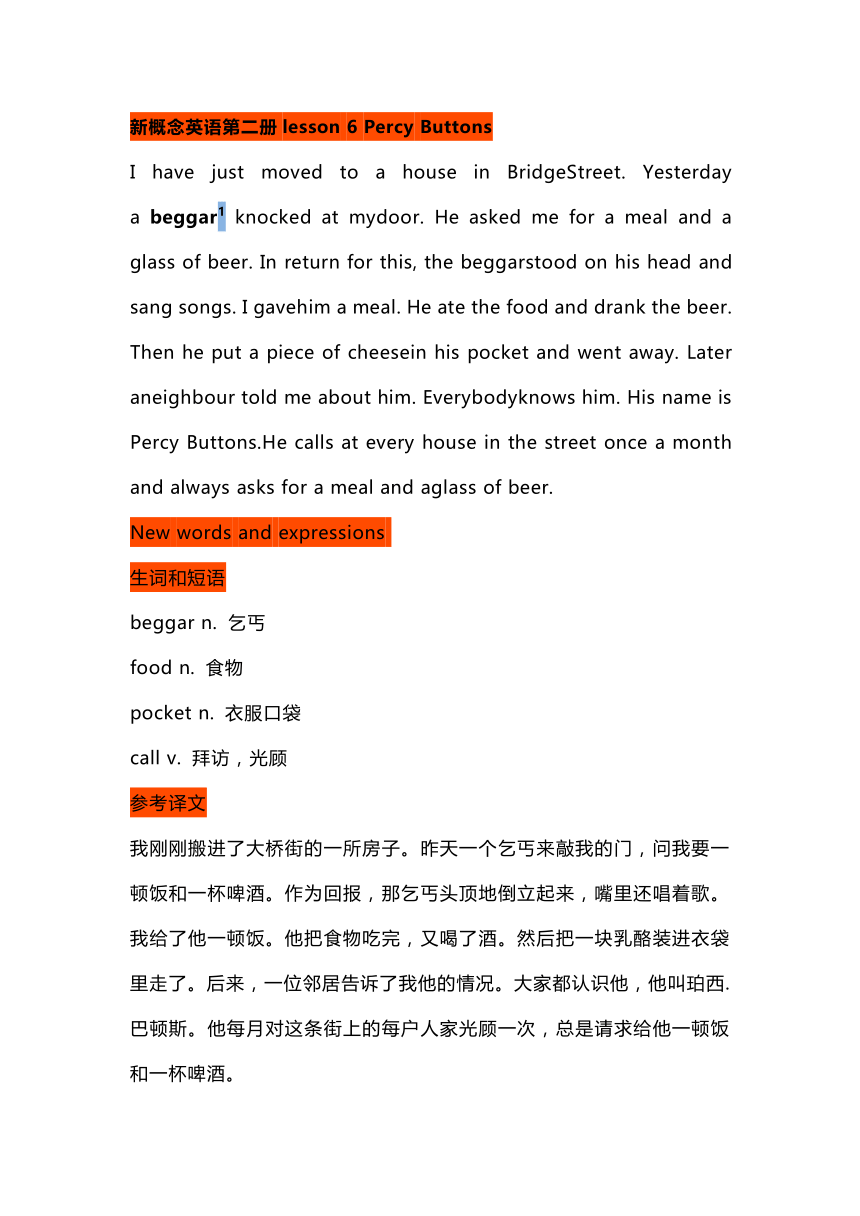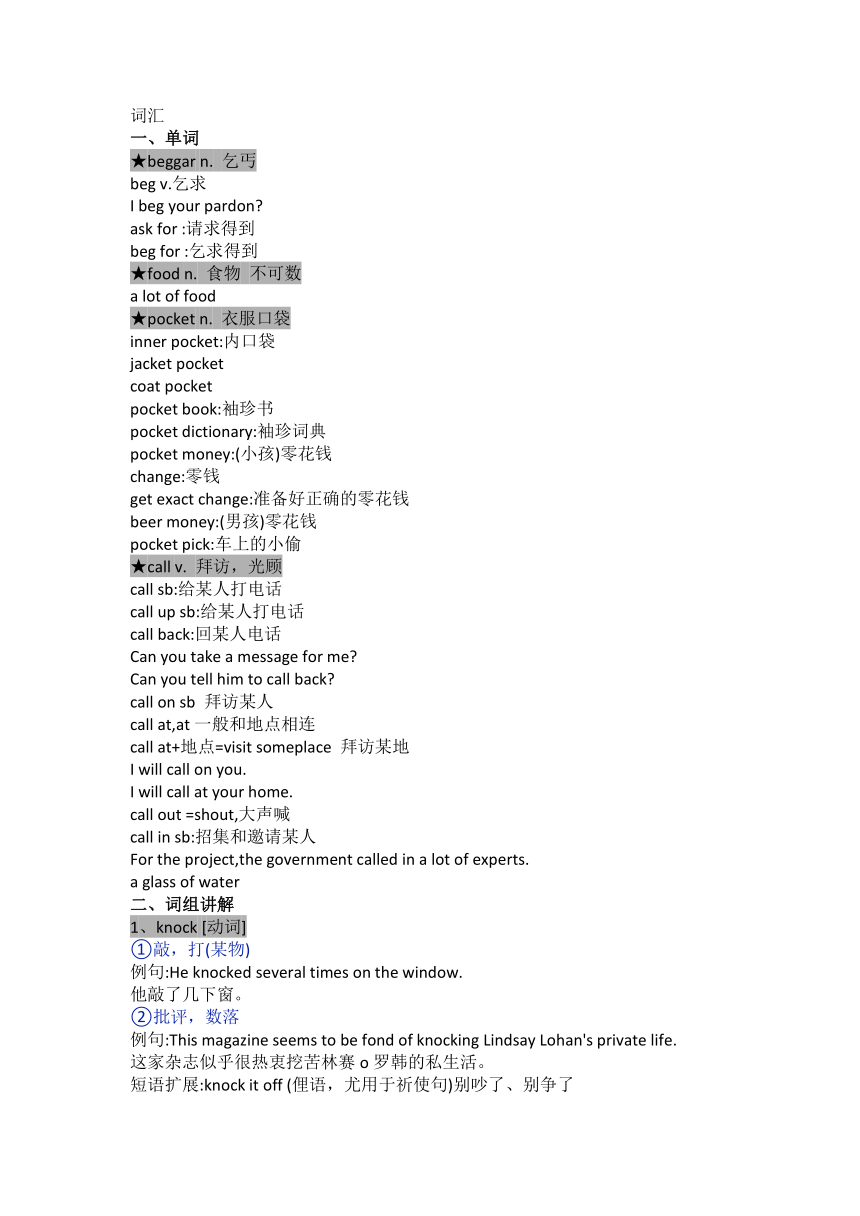新概念英语第二册 Lesson 6 Percy Buttons 讲义
文档属性
| 名称 | 新概念英语第二册 Lesson 6 Percy Buttons 讲义 |  | |
| 格式 | docx | ||
| 文件大小 | 23.7KB | ||
| 资源类型 | 教案 | ||
| 版本资源 | 新概念英语 | ||
| 科目 | 英语 | ||
| 更新时间 | 2023-09-27 22:48:15 | ||
图片预览



文档简介
新概念英语第二册lesson 6 Percy Buttons
I have just moved to a house in BridgeStreet. Yesterday a beggar1 knocked at mydoor. He asked me for a meal and a glass of beer. In return for this, the beggarstood on his head and sang songs. I gavehim a meal. He ate the food and drank the beer. Then he put a piece of cheesein his pocket and went away. Later aneighbour told me about him. Everybodyknows him. His name is Percy Buttons.He calls at every house in the street once a month and always asks for a meal and aglass of beer.
New words and expressions
生词和短语
beggar n. 乞丐
food n. 食物
pocket n. 衣服口袋
call v. 拜访,光顾
参考译文
我刚刚搬进了大桥街的一所房子。昨天一个乞丐来敲我的门,问我要一顿饭和一杯啤酒。作为回报,那乞丐头顶地倒立起来,嘴里还唱着歌。我给了他一顿饭。他把食物吃完,又喝了酒。然后把一块乳酪装进衣袋里走了。后来,一位邻居告诉了我他的情况。大家都认识他,他叫珀西.巴顿斯。他每月对这条街上的每户人家光顾一次,总是请求给他一顿饭和一杯啤酒。
词汇
一、单词
★beggar n. 乞丐
beg v.乞求
I beg your pardon
ask for :请求得到
beg for :乞求得到
★food n. 食物 不可数
a lot of food
★pocket n. 衣服口袋
inner pocket:内口袋
jacket pocket
coat pocket
pocket book:袖珍书
pocket dictionary:袖珍词典
pocket money:(小孩)零花钱
change:零钱
get exact change:准备好正确的零花钱
beer money:(男孩)零花钱
pocket pick:车上的小偷
★call v. 拜访,光顾
call sb:给某人打电话
call up sb:给某人打电话
call back:回某人电话
Can you take a message for me
Can you tell him to call back
call on sb 拜访某人
call at,at一般和地点相连
call at+地点=visit someplace 拜访某地
I will call on you.
I will call at your home.
call out =shout,大声喊
call in sb:招集和邀请某人
For the project,the government called in a lot of experts.
a glass of water
二、词组讲解
1、knock [动词]
①敲,打(某物)
例句:He knocked several times on the window.
他敲了几下窗。
②批评,数落
例句:This magazine seems to be fond of knocking Lindsay Lohan's private life.
这家杂志似乎很热衷挖苦林赛o罗韩的私生活。
短语扩展:knock it off (俚语,尤用于祈使句)别吵了、别争了
knock off (sth.) 停止做某事(尤指工作)
knock sb. out 击倒对手
knock sb. /sth. over 撞倒某人
knock sb. up (敲门、窗等)叫醒某人
knock也可作名词,表示短促的敲或打,也可指爆炸震动声
例句:I will give you a knock if you don't get up at 8 o'clock.
如果你八点钟还没起床我就来敲门。
短语扩展:take a knock (口语)蒙受经济或感情上的打击
2、stand on one's head 倒立
例句:Sometimes I feel dizzy after I stand on my head.
有时候倒立之后我会感到头晕。
stand on one's hands:用手着地
跪着,膝盖:knees, stand on one's knees
躺着,躺:lie,lie in bed,lie on one's back:仰面躺着
lie on one's side:侧躺
趴着:lie on one's stomach
3、He asked me for a meal and a glass of beer.
a glass of beer
a glass of water
a glass of milk
ask这个词,除了询问的意思之外,很多地方都能用到这个词,比如ask sb. to a party请某人赴会;You ask too high a price.你要价太高了;ask money for the church; ask a favor. 为教堂索求钱财;请求帮忙;比如像请人离开,也用ask。
下面看看相关的词组:
if you ask me 我认为, 依我说
ask about 打听, 询问, 查询
ask after 问候, 探问
ask around 到处打听
ask for 要; 请求, 征求 要(价) 找
ask sb. round 请某人来家
ask of 要求, 期望 向...问(问题)
ask out [口]请去作客 , 邀请外出 [美]引退, 辞职, 告辞
ask sb. in [out, up, down] 请进[出去, 上楼, 下楼]
4、in return for this,作为报答,这里的this指的是上文中的a meal and a glass of beer。
in return for 作为(对某物)的付款或回报;酬谢
例句:He gave her some dessert in return for her kindness.
他送了她一些点心以答谢她的好意。
5、……and went away. ……
go away 走开
相关go的词组:
go abroad出国
go for a walk去散步
go on a journey去旅行
go mad发狂[疯] 这个词以后会学到
go blind变瞎
go hungry挨饿
The story goes that ...
据说...
6、once a month /a week每月/周一次
twice a month /a week 每月/周两次
three times a month /a week 每月/周三次
four times a month /a week 每月/周四次
five times a month /a week 每月/周五次…… 依次类推
还可以说a year 等等,可以灵活运用。
语法
1.a, the与some的用法
当表示不确定的某个人或东西时,用不定冠词a/an:
He bought a book this afternoon.
今天下午他买了本书。
There is a man in front of your car.
你的汽车前面有一个男人。
当表示不可数的名词时,则需要由不定冠词加量词组成词组:
A cup of coffee, please.
请给我来一杯咖啡。
I need a sheet of paper.
我需要一张纸。
当表示一类事物的性质、状态时,可以用下列方法表示:
A tiger is a dangerous animal.
老虎是一种危险的动物。
Tigers are dangerous.
老虎是危险的。
Salt is necessary for/ to us all.
我们大家都需要盐。
some用于表示不确定的某些人或东西,可数和不可数都可以:
He put some books on the desk.
他把一些书放在了桌上。
Some students are absent today.
今天有些学生缺席了。
I like to put some sugar in the soup.
我喜欢在汤里加些糖。
如果指某个确定的人或事物或者上文已提到过的人或事物,则要用定冠词the(有时相当于this/ that):
The man has just left.
那人刚走。
Do you still want the ticket
你还想要这张票吗?
Yesterday I saw a beautiful skirt in a shop. But the skirt was too expensive.
昨天我在商店看见一条漂亮的裙子。但是那裙子太贵了。
在姓名、地名、国名(非复合词)以及月份、星期等前面不加任何冠词:
Tom is in Germany now. He studies physics in Berlin. He has a house in Bridge Street.
汤姆现在在德国。他在柏林学习物理学。在大桥街他有一所房子。
April is a pleasant month.
4月气候宜人。
He has classes on Monday.
他星期一有课。
冠词的用法比较复杂,需慢慢积累。
2.短语动词 (Phrasal verbs)
许多动词加上介词或副词后就会改变词义,因此需要记住整个短语,并根据上下文的意义判断动词在句子中的意思。常见的短语动词有:put on(穿上,戴上), take off(脱掉,摘掉), look for (寻找),look after(照顾,照料):
Don't put the cup on the table!
别把杯子放在桌上!
It is cold outside. Put on your coat.
今天外面冷。穿上外衣。
Someone has taken my pen.
有人把我的钢笔拿走了。
Take off your wet shoes, please.
请把你的湿鞋子脱掉。
She looked at the picture carefully.
她仔细地看着那幅画。
What are you looking for
你在找什么?
She looked after the sick baby for three days.
她照顾了那个病孩子3天。
3、时态(属于复习的,简要说一下)
一般现在时和一般过去时的区别:
①一般过去时的行为动词如果不带时间状语,则常表示一次性动作,而一般现在时的大多数行为动词不管有没有状语,常表示反复出现的动作。
例如:He had noodle for lunch. (一次性动作)
He has noodle for lunch. (反复性动作)
②一般现在时能用来表示普遍真理。客观存在等超越时间的意义,而一般过去时则不行。
例如:Teacher told us that the earth travels around the sun.
课文讲解
1.I have just moved to a house in Bridge Street.
move常用的意义是“动”、“移动”。在这句话里它的意思是“搬家”、“迁移”,为不及物动词。在表达“搬家”这个意思时move可以单独使用,也可以组成短语move to, move into, move in, move out等:
Jack has moved out. John will move in the day after tomorrow.
杰克已经搬走了。约翰后天搬进来。
2.He asked me for a meal and a glass of beer.
在表示请求时,可以用ask+sb.+for+sth.,也可以直接用ask for:
Don't always ask others for help.
别总向他人求助。
He never asks his parents for money.
他从来不向父母要钱。
3.in return for this
in return可以单独使用,也可以加介词for说明原因:
You lent me this interesting book last month. In return (for it), I'll show you some picture books.
你上个月把这本有趣的书借给了我。作为报答,我将给你看一些画册。
In return for your help, I invite you to spend the weekend with my family.
你帮了我的忙。作为回报,我邀请你与我的家人一起过这个周末。
4.Later a neighbour told me about him.
介词about可以和一些动词连用,以表示“关于……(的)”、“涉及……(的)”:
Please tell me about the accident.
请告诉我这次事故的一些情况。
He spoke to me about his dog.
他和我讲了讲他的狗。
I have read about him.
关于他的情况我曾经读到过。
5.once a month
once表示频率时后面直接加表示时间的名词:
Jane wrote to her parents once a week.
简每星期给父母写封信。
He goes back to the South once a year.
他每年回一次南方。
The postman calls once a day.
邮递员每天来一次。
I have just moved to a house in BridgeStreet. Yesterday a beggar1 knocked at mydoor. He asked me for a meal and a glass of beer. In return for this, the beggarstood on his head and sang songs. I gavehim a meal. He ate the food and drank the beer. Then he put a piece of cheesein his pocket and went away. Later aneighbour told me about him. Everybodyknows him. His name is Percy Buttons.He calls at every house in the street once a month and always asks for a meal and aglass of beer.
New words and expressions
生词和短语
beggar n. 乞丐
food n. 食物
pocket n. 衣服口袋
call v. 拜访,光顾
参考译文
我刚刚搬进了大桥街的一所房子。昨天一个乞丐来敲我的门,问我要一顿饭和一杯啤酒。作为回报,那乞丐头顶地倒立起来,嘴里还唱着歌。我给了他一顿饭。他把食物吃完,又喝了酒。然后把一块乳酪装进衣袋里走了。后来,一位邻居告诉了我他的情况。大家都认识他,他叫珀西.巴顿斯。他每月对这条街上的每户人家光顾一次,总是请求给他一顿饭和一杯啤酒。
词汇
一、单词
★beggar n. 乞丐
beg v.乞求
I beg your pardon
ask for :请求得到
beg for :乞求得到
★food n. 食物 不可数
a lot of food
★pocket n. 衣服口袋
inner pocket:内口袋
jacket pocket
coat pocket
pocket book:袖珍书
pocket dictionary:袖珍词典
pocket money:(小孩)零花钱
change:零钱
get exact change:准备好正确的零花钱
beer money:(男孩)零花钱
pocket pick:车上的小偷
★call v. 拜访,光顾
call sb:给某人打电话
call up sb:给某人打电话
call back:回某人电话
Can you take a message for me
Can you tell him to call back
call on sb 拜访某人
call at,at一般和地点相连
call at+地点=visit someplace 拜访某地
I will call on you.
I will call at your home.
call out =shout,大声喊
call in sb:招集和邀请某人
For the project,the government called in a lot of experts.
a glass of water
二、词组讲解
1、knock [动词]
①敲,打(某物)
例句:He knocked several times on the window.
他敲了几下窗。
②批评,数落
例句:This magazine seems to be fond of knocking Lindsay Lohan's private life.
这家杂志似乎很热衷挖苦林赛o罗韩的私生活。
短语扩展:knock it off (俚语,尤用于祈使句)别吵了、别争了
knock off (sth.) 停止做某事(尤指工作)
knock sb. out 击倒对手
knock sb. /sth. over 撞倒某人
knock sb. up (敲门、窗等)叫醒某人
knock也可作名词,表示短促的敲或打,也可指爆炸震动声
例句:I will give you a knock if you don't get up at 8 o'clock.
如果你八点钟还没起床我就来敲门。
短语扩展:take a knock (口语)蒙受经济或感情上的打击
2、stand on one's head 倒立
例句:Sometimes I feel dizzy after I stand on my head.
有时候倒立之后我会感到头晕。
stand on one's hands:用手着地
跪着,膝盖:knees, stand on one's knees
躺着,躺:lie,lie in bed,lie on one's back:仰面躺着
lie on one's side:侧躺
趴着:lie on one's stomach
3、He asked me for a meal and a glass of beer.
a glass of beer
a glass of water
a glass of milk
ask这个词,除了询问的意思之外,很多地方都能用到这个词,比如ask sb. to a party请某人赴会;You ask too high a price.你要价太高了;ask money for the church; ask a favor. 为教堂索求钱财;请求帮忙;比如像请人离开,也用ask。
下面看看相关的词组:
if you ask me 我认为, 依我说
ask about 打听, 询问, 查询
ask after 问候, 探问
ask around 到处打听
ask for 要; 请求, 征求 要(价) 找
ask sb. round 请某人来家
ask of 要求, 期望 向...问(问题)
ask out [口]请去作客 , 邀请外出 [美]引退, 辞职, 告辞
ask sb. in [out, up, down] 请进[出去, 上楼, 下楼]
4、in return for this,作为报答,这里的this指的是上文中的a meal and a glass of beer。
in return for 作为(对某物)的付款或回报;酬谢
例句:He gave her some dessert in return for her kindness.
他送了她一些点心以答谢她的好意。
5、……and went away. ……
go away 走开
相关go的词组:
go abroad出国
go for a walk去散步
go on a journey去旅行
go mad发狂[疯] 这个词以后会学到
go blind变瞎
go hungry挨饿
The story goes that ...
据说...
6、once a month /a week每月/周一次
twice a month /a week 每月/周两次
three times a month /a week 每月/周三次
four times a month /a week 每月/周四次
five times a month /a week 每月/周五次…… 依次类推
还可以说a year 等等,可以灵活运用。
语法
1.a, the与some的用法
当表示不确定的某个人或东西时,用不定冠词a/an:
He bought a book this afternoon.
今天下午他买了本书。
There is a man in front of your car.
你的汽车前面有一个男人。
当表示不可数的名词时,则需要由不定冠词加量词组成词组:
A cup of coffee, please.
请给我来一杯咖啡。
I need a sheet of paper.
我需要一张纸。
当表示一类事物的性质、状态时,可以用下列方法表示:
A tiger is a dangerous animal.
老虎是一种危险的动物。
Tigers are dangerous.
老虎是危险的。
Salt is necessary for/ to us all.
我们大家都需要盐。
some用于表示不确定的某些人或东西,可数和不可数都可以:
He put some books on the desk.
他把一些书放在了桌上。
Some students are absent today.
今天有些学生缺席了。
I like to put some sugar in the soup.
我喜欢在汤里加些糖。
如果指某个确定的人或事物或者上文已提到过的人或事物,则要用定冠词the(有时相当于this/ that):
The man has just left.
那人刚走。
Do you still want the ticket
你还想要这张票吗?
Yesterday I saw a beautiful skirt in a shop. But the skirt was too expensive.
昨天我在商店看见一条漂亮的裙子。但是那裙子太贵了。
在姓名、地名、国名(非复合词)以及月份、星期等前面不加任何冠词:
Tom is in Germany now. He studies physics in Berlin. He has a house in Bridge Street.
汤姆现在在德国。他在柏林学习物理学。在大桥街他有一所房子。
April is a pleasant month.
4月气候宜人。
He has classes on Monday.
他星期一有课。
冠词的用法比较复杂,需慢慢积累。
2.短语动词 (Phrasal verbs)
许多动词加上介词或副词后就会改变词义,因此需要记住整个短语,并根据上下文的意义判断动词在句子中的意思。常见的短语动词有:put on(穿上,戴上), take off(脱掉,摘掉), look for (寻找),look after(照顾,照料):
Don't put the cup on the table!
别把杯子放在桌上!
It is cold outside. Put on your coat.
今天外面冷。穿上外衣。
Someone has taken my pen.
有人把我的钢笔拿走了。
Take off your wet shoes, please.
请把你的湿鞋子脱掉。
She looked at the picture carefully.
她仔细地看着那幅画。
What are you looking for
你在找什么?
She looked after the sick baby for three days.
她照顾了那个病孩子3天。
3、时态(属于复习的,简要说一下)
一般现在时和一般过去时的区别:
①一般过去时的行为动词如果不带时间状语,则常表示一次性动作,而一般现在时的大多数行为动词不管有没有状语,常表示反复出现的动作。
例如:He had noodle for lunch. (一次性动作)
He has noodle for lunch. (反复性动作)
②一般现在时能用来表示普遍真理。客观存在等超越时间的意义,而一般过去时则不行。
例如:Teacher told us that the earth travels around the sun.
课文讲解
1.I have just moved to a house in Bridge Street.
move常用的意义是“动”、“移动”。在这句话里它的意思是“搬家”、“迁移”,为不及物动词。在表达“搬家”这个意思时move可以单独使用,也可以组成短语move to, move into, move in, move out等:
Jack has moved out. John will move in the day after tomorrow.
杰克已经搬走了。约翰后天搬进来。
2.He asked me for a meal and a glass of beer.
在表示请求时,可以用ask+sb.+for+sth.,也可以直接用ask for:
Don't always ask others for help.
别总向他人求助。
He never asks his parents for money.
他从来不向父母要钱。
3.in return for this
in return可以单独使用,也可以加介词for说明原因:
You lent me this interesting book last month. In return (for it), I'll show you some picture books.
你上个月把这本有趣的书借给了我。作为报答,我将给你看一些画册。
In return for your help, I invite you to spend the weekend with my family.
你帮了我的忙。作为回报,我邀请你与我的家人一起过这个周末。
4.Later a neighbour told me about him.
介词about可以和一些动词连用,以表示“关于……(的)”、“涉及……(的)”:
Please tell me about the accident.
请告诉我这次事故的一些情况。
He spoke to me about his dog.
他和我讲了讲他的狗。
I have read about him.
关于他的情况我曾经读到过。
5.once a month
once表示频率时后面直接加表示时间的名词:
Jane wrote to her parents once a week.
简每星期给父母写封信。
He goes back to the South once a year.
他每年回一次南方。
The postman calls once a day.
邮递员每天来一次。
同课章节目录
